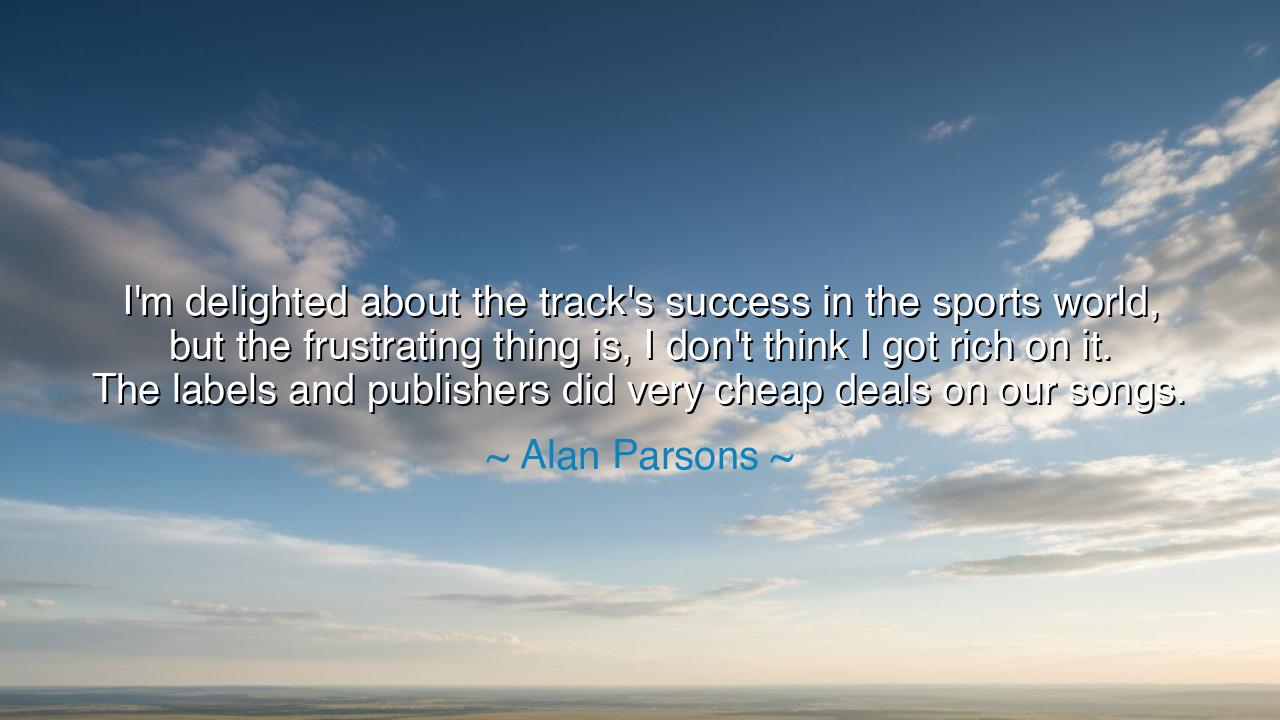
I'm delighted about the track's success in the sports world, but
I'm delighted about the track's success in the sports world, but the frustrating thing is, I don't think I got rich on it. The labels and publishers did very cheap deals on our songs.






Hear now the words of Alan Parsons, master of sound and architect of melodies that filled arenas, who declared: “I’m delighted about the track’s success in the sports world, but the frustrating thing is, I don’t think I got rich on it. The labels and publishers did very cheap deals on our songs.” Within this lament lies a lesson not only for musicians, but for all who labor: that the fruit of one’s work is often enjoyed most by those who neither sowed nor reaped, but who claimed ownership by cunning and contract. It is the ancient struggle between the creator and the merchant, between art and profit.
The meaning of his words shines clear. Parsons rejoices in the success of his work, particularly in the sports world, where one of his compositions became an anthem of triumph, played as athletes entered arenas, inspiring both player and crowd. Yet his joy is shadowed by frustration: though the music brought glory and recognition, it brought little wealth to its creator. The riches flowed instead to labels and publishers, those who struck cheap deals and secured the greater share of profit. Thus, his words reveal the double-edged nature of creation in a world governed by commerce.
This truth is not new. Consider the story of Mozart, whose genius filled palaces with music that stirred the heavens, yet who died poor and buried in an unmarked grave. The nobles who commissioned his works enjoyed his brilliance, but he himself received little security from his art. Or reflect on the blues musicians of America’s South, whose songs birthed entire genres, yet who lived and died in poverty while record companies amassed fortunes from their sound. The pattern repeats through ages: the creator shines, but the merchant profits.
Parsons’ lament comes from his own career, where “Sirius”, an instrumental track by The Alan Parsons Project, became one of the most iconic entrance themes in sports, particularly immortalized by the Chicago Bulls in the era of Michael Jordan. The song echoed through stadiums, heralding glory, electrifying millions. And yet, as Parsons himself confessed, the rights had been sold cheaply, the contracts binding him to meager returns. Thus, though his work stirred crowds, he reaped but a fraction of its worth. His quote is both celebration and sorrow: the delight of legacy, and the sting of injustice.
The deeper lesson is this: value your creation, and guard it wisely. The world will eagerly consume your labor, but it will not always reward you fairly unless you understand its ways. Passion must be wedded to prudence, and art must walk hand in hand with wisdom. For it is not enough to create beauty; one must also protect it from being consumed by the hungry jaws of exploitation. Parsons’ experience is a reminder that creators must honor themselves as much as their craft.
And yet, his words also carry a subtle triumph. Though money was lost, the music endures. Riches fade, but legacy remains. The track that filled stadiums became larger than wealth—it became part of culture, part of history. And in this, Parsons possesses a treasure greater than gold: the power to inspire across generations. Wealth may pass into the hands of labels and publishers, but the memory of the music belongs forever to the people.
Therefore, O children of tomorrow, heed this wisdom: rejoice in your creations, but do not be careless with their worth. Study, prepare, and guard your rights, lest others take the harvest of your toil. Yet if fortune slips through your fingers, remember also that the greatest riches are not always material. A song that stirs the soul, a work that changes the world, a legacy that endures beyond death—these are treasures no publisher can own.
So let Parsons’ words echo through time: create boldly, protect wisely, and treasure the legacy of your art. For while wealth may be stolen, the spirit of creation endures, and it is this spirit that crowns the true creator with immortality.






AAdministratorAdministrator
Welcome, honored guests. Please leave a comment, we will respond soon